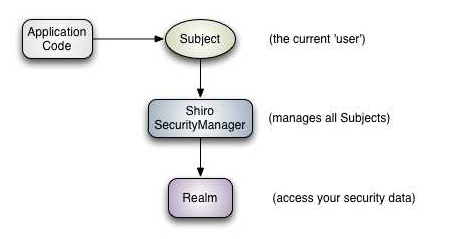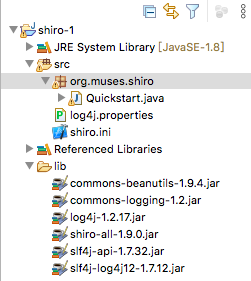shiro概述
一、概述:
Apache Shiro 是 Java 的一个安全(权限)框架,其不仅可以用在 JavaSE 环境,也可以用在 JavaEE 环境。可以完成:认证、授权、加密、会话管理、与Web 集成、缓存 等。
jar包下载:https://repo1.maven.org/maven2/org/apache/shiro/shiro-all/1.9.0/shiro-all-1.9.0.jar
源码下载地址(1.9.0 & 1.3.2):(源码下载具有非常好的参考意义)
基本功能:
-
Authentication:身份认证/登录,验证用户是不是拥有相应的身份;
-
Authorization:授权,即权限验证,验证某个已认证的用户是否拥有某个权限;即判断用 户是否能进行什么操作,如:验证某个用户是否拥有某个角色。或者细粒度的验证某个用户 对某个资源是否具有某个权限;
-
Session Manager:会话管理,即用户登录后就是一次会话,在没有退出之前,它的所有 信息都在会话中;会话可以是普通 JavaSE 环境,也可以是 Web 环境的;
-
Cryptography:加密,保护数据的安全性,如密码加密存储到数据库,而不是明文存储;
-
Web Support:Web 支持,可以非常容易的集成到Web 环境;
-
Caching:缓存,比如用户登录后,其用户信息、拥有的角色/权限不必每次去查,这样可 以提高效率;
-
Concurrency:Shiro 支持多线程应用的并发验证,即如在一个线程中开启另一个线程,能
-
把权限自动传播过去;
-
Testing:提供测试支持;
-
Run As:允许一个用户假装为另一个用户(如果他们允许)的身份进行访问;
-
Remember Me:记住我,这个是非常常见的功能,即一次登录后,下次再来的话不用登 录了
运行流程:
Subject 代表了当前“用户”,当 应用程序请求(执行)过来时,需要 通过subject 来交互 subject 可以判断用户是否登入;可以获取session;可以判断是否拥有权限等; 这个用户不一定 是一个具体的人,与当前应用交互的任何东西都是 Subject,如网络爬虫, 机器人等;与 Subject 的所有交互都会委托给 SecurityManager; Subject 其实是一个门面,SecurityManager 才是实际的执行者
securitymanager 是安全管理器,管理所有安全相关的交互,管理所有subject,它相当于 SpringMVC 中 DispatcherServlet 的角色;
Realm:Shiro 从 Realm 获取安全数据(如用户、角色、权限),就是说 SecurityManager 要验证用户身份,那么它需要从 Realm 获取相应的用户 进行比较以确定用户身份是否合法;也需要从 Realm 得到用户相应的角色/ 权限进行验证用户是否能进行操作;可以把 Realm 看成 DataSource

二、shiro的java se demo:
目录结构如下图,其中 Quickstart.java 为源文件中的例子 shiro-root-1.9.0/samples/quickstart/src/main/java/Quickstart.java;shiro.ini为源文件中的文件(shiro-root-1.9.0/samples/quickstart/src/main/resources/shiro.ini);

Quickstart.java: 展示了如何获取到Subject;如何获取session ;是否登入的判断;执行登入;判断用户权限;是否具备某行为;执行登出;

1 /* 2 * Licensed to the Apache Software Foundation (ASF) under one 3 * or more contributor license agreements. See the NOTICE file 4 * distributed with this work for additional information 5 * regarding copyright ownership. The ASF licenses this file 6 * to you under the Apache License, Version 2.0 (the 7 * "License"); you may not use this file except in compliance 8 * with the License. You may obtain a copy of the License at 9 * 10 * http://www.apache.org/licenses/LICENSE-2.0 11 * 12 * Unless required by applicable law or agreed to in writing, 13 * software distributed under the License is distributed on an 14 * "AS IS" BASIS, WITHOUT WARRANTIES OR CONDITIONS OF ANY 15 * KIND, either express or implied. See the License for the 16 * specific language governing permissions and limitations 17 * under the License. 18 */ 19 package org.muses.shiro; 20 21 import org.apache.shiro.SecurityUtils; 22 import org.apache.shiro.authc.*; 23 import org.apache.shiro.config.IniSecurityManagerFactory; 24 import org.apache.shiro.mgt.SecurityManager; 25 import org.apache.shiro.session.Session; 26 import org.apache.shiro.subject.Subject; 27 import org.apache.shiro.util.Factory; 28 import org.slf4j.Logger; 29 import org.slf4j.LoggerFactory; 30 31 32 /** 33 * Simple Quickstart application showing how to use Shiro's API. 34 * 35 * @since 0.9 RC2 36 */ 37 public class Quickstart { 38 39 private static final transient Logger log = LoggerFactory.getLogger(Quickstart.class); 40 41 42 public static void main(String[] args) { 43 44 // The easiest way to create a Shiro SecurityManager with configured 45 // realms, users, roles and permissions is to use the simple INI config. 46 // We'll do that by using a factory that can ingest a .ini file and 47 // return a SecurityManager instance: 48 49 // Use the shiro.ini file at the root of the classpath 50 // (file: and url: prefixes load from files and urls respectively): 51 Factory<SecurityManager> factory = new IniSecurityManagerFactory("classpath:shiro.ini"); 52 SecurityManager securityManager = factory.getInstance(); 53 54 // for this simple example quickstart, make the SecurityManager 55 // accessible as a JVM singleton. Most applications wouldn't do this 56 // and instead rely on their container configuration or web.xml for 57 // webapps. That is outside the scope of this simple quickstart, so 58 // we'll just do the bare minimum so you can continue to get a feel 59 // for things. 60 SecurityUtils.setSecurityManager(securityManager); 61 62 // Now that a simple Shiro environment is set up, let's see what you can do: 63 64 65 //获取当前的subject,调用SecurityUtils.getSubject(); 66 // get the currently executing user: 67 Subject currentUser = SecurityUtils.getSubject(); 68 69 //测试使用session 70 //获取session:Subject#getSession() 71 // Do some stuff with a Session (no need for a web or EJB container!!!) 72 Session session = currentUser.getSession(); 73 session.setAttribute("someKey", "aValue"); 74 String value = (String) session.getAttribute("someKey"); 75 if (value.equals("aValue")) { 76 log.info("-----》Retrieved the correct value! [" + value + "]"); 77 } 78 79 // let's login the current user so we can check against roles and permissions: 80 81 //测试当前的用户是否被认证,即是否已经登入 82 //调用Subject#isAuthenticated() 83 if (!currentUser.isAuthenticated()) { 84 //用户名和密码封装为UsernamePasswordToken对象 85 UsernamePasswordToken token = new UsernamePasswordToken("lonestarr", "vespa"); 86 token.setRememberMe(true); 87 try { 88 //执行登入 89 currentUser.login(token); 90 //若没有指定的账户,则shiro将抛出UnknownAccountException 91 } catch (UnknownAccountException uae) { 92 log.info("There is no user with username of " + token.getPrincipal()); 93 //若账户存在,但密码不匹配,则shiro将抛出IncorrectCredentialsException 94 } catch (IncorrectCredentialsException ice) { 95 log.info("Password for account " + token.getPrincipal() + " was incorrect!"); 96 //若用户被锁定,抛出LockedAccountException 97 } catch (LockedAccountException lae) { 98 log.info("The account for username " + token.getPrincipal() + " is locked. " + 99 "Please contact your administrator to unlock it."); 100 } 101 //所有上面认证异常的父类 102 // ... catch more exceptions here (maybe custom ones specific to your application? 103 catch (AuthenticationException ae) { 104 //unexpected condition? error? 105 } 106 } 107 108 //say who they are: 109 //print their identifying principal (in this case, a username): 110 log.info("----》User [" + currentUser.getPrincipal() + "] logged in successfully."); 111 112 //test a role: 113 if (currentUser.hasRole("schwartz")) { 114 log.info("May the Schwartz be with you!"); 115 } else { 116 log.info("Hello, mere mortal."); 117 } 118 //测试用户是否具备某一个行为,调用Subject的isPermitted()的方法; 119 //test a typed permission (not instance-level) 120 if (currentUser.isPermitted("lightsaber:wield")) { 121 log.info("You may use a lightsaber ring. Use it wisely."); 122 } else { 123 log.info("Sorry, lightsaber rings are for schwartz masters only."); 124 } 125 //测试用户是否具备某一行为 126 //a (very powerful) Instance Level permission: 127 if (currentUser.isPermitted("winnebago:drive:eagle5")) { 128 log.info("You are permitted to 'drive' the winnebago with license plate (id) 'eagle5'. " + 129 "Here are the keys - have fun!"); 130 } else { 131 log.info("Sorry, you aren't allowed to drive the 'eagle5' winnebago!"); 132 } 133 134 //执行登出调用Subject的logout()的方法; 135 //all done - log out! 136 currentUser.logout(); 137 138 System.exit(0); 139 } 140 }
三、shiro整合SSM(spring_springmvc_mybatis)
https://www.cnblogs.com/lixiuming521125/p/16255298.html





 浙公网安备 33010602011771号
浙公网安备 33010602011771号